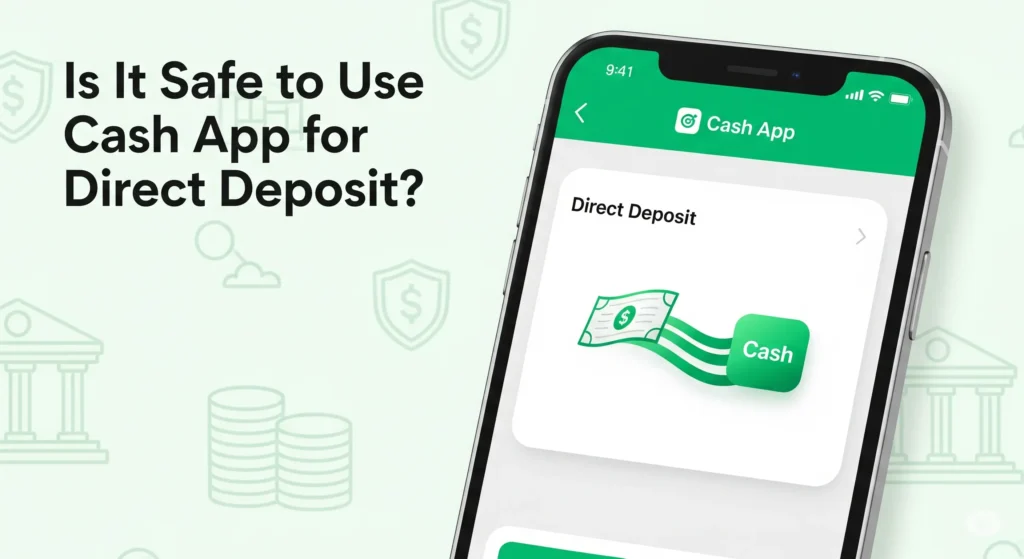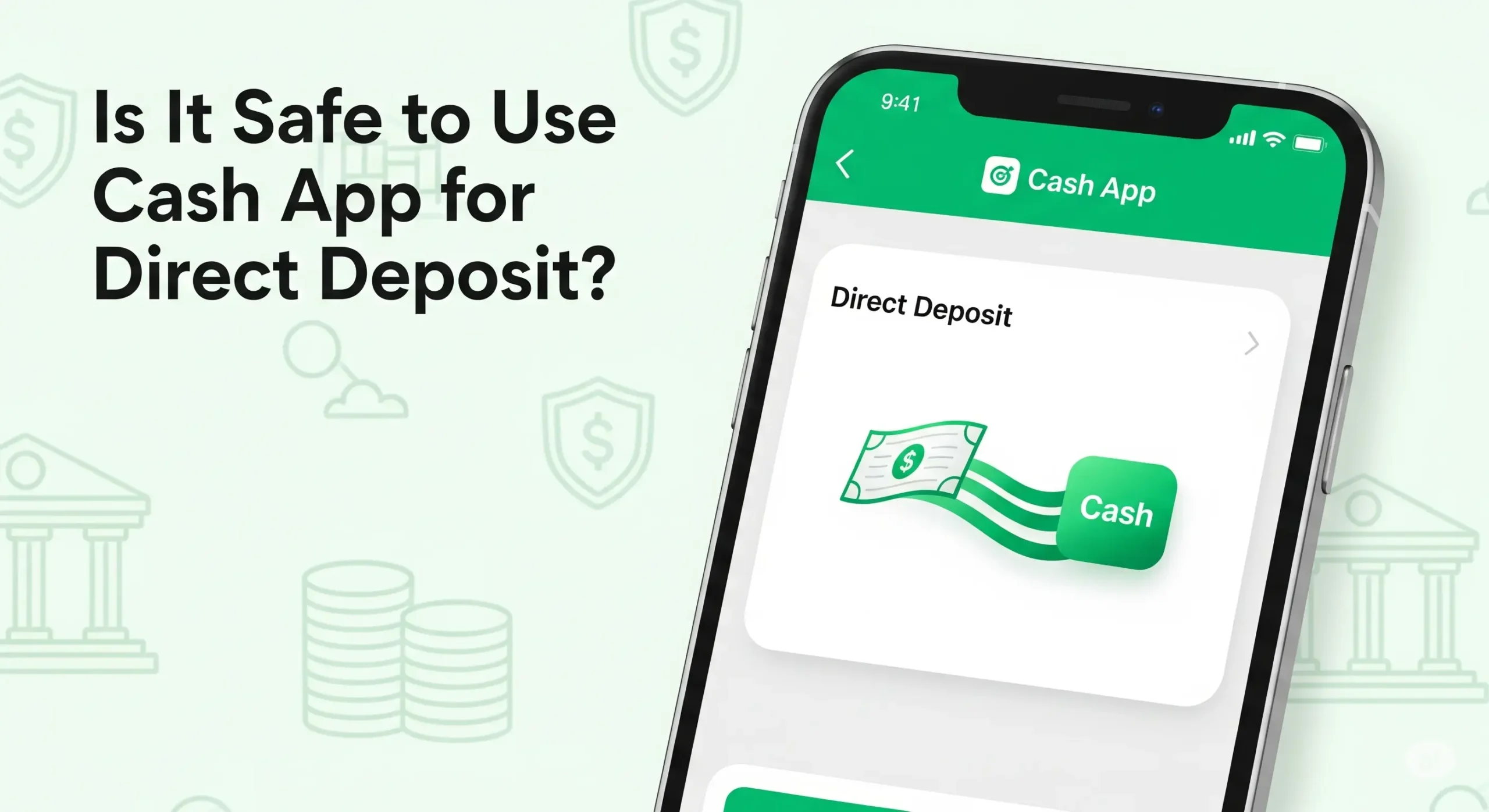When I first started using Cash App, I was like many of you—sending money to friends for dinner, splitting rent with roommates, or just transferring small amounts here and there.
But then I noticed something interesting: Cash App also lets you set up direct deposit. That means your paycheck can go straight into your Cash App balance, just like a regular bank account.
At first, I was excited. No more waiting for transfers from my bank to Cash App. But then the big question hit me: is it safe to use Cash App for direct deposit?
I decided to try it myself, and at the same time, I dug deep into the research, policies, and security practices. In this article, I’ll walk you through my personal experience, what I learned, the pros and cons, and whether it’s truly safe.

My First Time Using Cash App for Direct Deposit
Setting it up was surprisingly easy. Inside Cash App, there’s a section where you can get your routing and account numbers. I copied those and gave them to my employer, just like I would with a regular bank account. Within a couple of weeks, my paycheck landed directly in my Cash App balance.
It felt convenient—I could use the money instantly to pay friends, invest in stocks or Bitcoin (since Cash App has that option), or transfer to my bank. But still, I couldn’t help wondering: Was my money as protected as it would be with a traditional bank?
How Cash App Direct Deposit Works
Cash App partners with Lincoln Savings Bank and Sutton Bank to provide banking services. This means when you set up direct deposit, your paycheck doesn’t just float in Cash App’s system—it goes through one of these banks.
Technically, you’re getting a bank account number and routing number, so your employer can push your paycheck into that account, which Cash App then reflects in your balance.
So far, so good. But safety is more than just where the money lands—it’s about protections in case something goes wrong.
Is Cash App FDIC Insured?
Here’s where things get tricky. Traditional bank accounts are insured by the FDIC (Federal Deposit Insurance Corporation), up to $250,000 per account. This means if your bank fails, your money is protected.
Cash App itself is not a bank. Instead, it relies on its partner banks. So if the money is in transit or sitting in the account associated with those banks, it can have FDIC protection. But once it’s fully inside Cash App and you’re just holding it as a balance, FDIC protection doesn’t directly apply.
This is one of the main concerns that made me hesitate. If you’re asking, is it safe to use Cash App for direct deposit, this is something you must consider carefully.
My Research: Security Features Cash App Offers
Beyond FDIC insurance, I looked at what security protections Cash App provides. Here’s what I found:
- Encryption: All payments and transfers are encrypted, both in transit and at rest.
- Two-Factor Authentication (2FA): You can enable this for extra protection when logging in.
- PIN and Face/Touch ID: You can lock the app with a PIN code or biometric verification.
- Instant Notifications: Every time money moves in or out, Cash App sends an alert.
These features gave me some peace of mind. I liked being able to see instantly when money landed or left my account.
The Downsides I Experienced
While using Cash App for direct deposit was convenient, I also ran into a few downsides:
- Customer Service Can Be Slow – If something goes wrong, there’s no physical bank branch to walk into. I once had a delay in seeing my paycheck and had to wait 24 hours to get an email response.
- No Overdraft Protection – Unlike a traditional bank, Cash App doesn’t offer overdraft options. If your balance is low, payments just won’t go through.
- Limited FDIC Protection – Like I explained earlier, this is a big sticking point. Your paycheck might be insured during transfer, but once it’s just sitting in your Cash App balance, it’s not directly protected.
Why People Still Use Cash App Direct Deposit
Despite these downsides, many people—including me at times—still use Cash App for direct deposit. Why?
- Instant Access to Money – Paychecks often arrive 1–2 days earlier compared to traditional banks.
- Seamless Integration – You can instantly use your money for payments, Bitcoin, or investing.
- Ease of Use – No paperwork, no physical banks, just a few taps on your phone.
For someone who mainly needs speed and convenience, this makes sense.
ALSO READ: 9 Secrets You Must Know: Is It Safe to Use HappyMod?
Who Should Avoid Using Cash App for Direct Deposit
After my experience and research, I’d say Cash App direct deposit may not be the best choice if:
- You keep large balances in your account (since FDIC protection is limited).
- You rely on fast customer service if issues happen.
- You want the full range of banking services (loans, credit cards, etc.).
If you’re in one of these categories, sticking with a traditional bank or credit union might be safer.
Safety Tips if You Use Cash App for Direct Deposit
If you decide to go ahead with it, here are some tips I personally follow to stay safe:
- Don’t keep your entire paycheck in Cash App—transfer to your bank regularly.
- Enable 2FA and PIN lock for extra security.
- Keep your app updated to avoid vulnerabilities.
- Beware of scams—Cash App won’t ever ask for your login details or codes via text/email.
- Check your employer’s setup carefully when adding your routing/account info.
ALSO READ: 12 Surprising Insights Into Is Rocket Money Safe to Use Today
My Verdict: Is It Safe to Use Cash App for Direct Deposit?
So, is it safe to use Cash App for direct deposit? After using it personally and digging through the facts, here’s my honest conclusion:
Yes, it can be safe for small amounts and convenience, especially if you like getting your paycheck early and using Cash App daily. But I wouldn’t rely on it as my primary bank account. The lack of consistent FDIC protection and slower customer service are major drawbacks compared to traditional banks.
In my own life, I still use Cash App for direct deposit sometimes—especially when I want quick access to funds—but I always transfer most of the money to my actual bank account. That way, I get the best of both worlds: Cash App convenience and traditional bank safety.
FAQs About Cash App Direct Deposit
1. How early can you get your paycheck with Cash App?
Cash App often delivers paychecks up to 2 days earlier than traditional banks, depending on your employer.
2. Is Cash App direct deposit free?
Yes, setting up and receiving direct deposit through Cash App is free of charge.
3. Can I use Cash App as my only bank account?
You can, but it’s not recommended since it lacks full FDIC protection and traditional banking services.
4. What’s the maximum direct deposit amount on Cash App?
Currently, Cash App allows direct deposits up to $25,000 per deposit and $50,000 within 24 hours.
5. Is it safe to use Cash App for direct deposit compared to banks?
It’s safe in many cases thanks to encryption and bank partnerships, but not as secure as a traditional FDIC-insured bank account for large balances.
